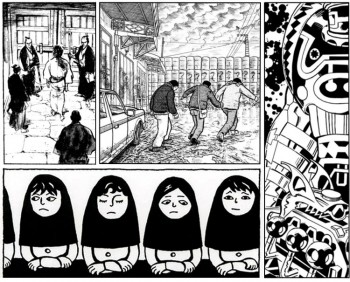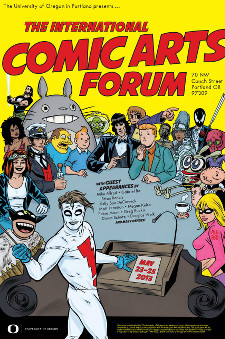
December 8, 2013
 CR Newsmaker Interview: Benjamin Saunders
CR Newsmaker Interview: Benjamin Saunders

 Benjamin Saunders
Benjamin Saunders is a professor of English at the University Oregon and the director of its
Comics & Cartoon Studies program. On December 3, the university
announced that a private donor had pledged $200,000 -- to be donated at a rate of $50,000 a year for four years -- to go into an endowment for the program, which supports an undergraduate minor at the university, hailed as the first of its kind. Saunders noted that while the investment would be used to support classroom visits from working comics professionals and potential comics-art exhibitions at
the Jordan Schnitzer Museum of Art, the value of the contribution could also be felt in the vote of confidence from one donor for the program entire.
I had a few follow-up questions, which Saunders answered so well I wanted to provide their entirety here, the only change being taking the questions themselves out of e-mailed short-hand and tweaking a couple of things syntax-wise. I hope he won't mind.
I thank Professor for his time and these articulate answers. There are dozens of good things that can happen to comics over the next couple of decades, and the
institutional attention of universities where actualized individuals work not within a splendid class or two but in terms of a program drawing on resources from multiple departments and the wider communities, that is indeed one of those things.
TOM SPURGEON: Was the money you received directed
to be spent a certain way?
BENJAMIN SAUNDERS: The donor was very specific that the funds be used to enhance the study of comics -- i.e. panel cartoons, comic books, comic strips, graphic novels, digital comics -- as distinct from other forms of cultural production. We have been granted plenty of leeway to determine how best that can be done within the parameters of our program. I think the primary desire of the donor is that programs such as ours will contribute to a better appreciation and understanding among the general public with regard to the emotional and aesthetic range, the global character, and the extended history of this beautiful expressive medium that we call "comics." That happens to be my goal, too. I'd like to see more people reading more, and more different, comics. This endowment will help to make that task easier.
SPURGEON: Does that money need to be spent over a specific, designated period of time.
SAUNDERS: The way endowment gifts work is that
the UO Foundation invests the money in high-yield accounts and then we faculty working in the Minor get to spend a portion of the interest, annually. So the money never runs out -- this is a permanent income stream. Of course that means that, from year to year, the sums we actually have to spend are relatively modest -- perhaps between $8000 and $10000 annually. But when you have nothing, $8000 is a lot.
And if we don't touch it for, say, a year, then we have quite a nice amount for a bigger event -- a two-day conference or an education exhibit, for example.
The real beauty of this arrangement is that the endowment is always there -- and we can build on it, if other donors choose to invest in our program.
I see this as just the first peg of the tent. I'd love to be able to create, say, an "artist-in-residence" program next. I imagine -- I dream -- that one day we could get a large enough endowment to keep a young, ambitious creator fed and sheltered for, say, a term, giving him/her the space to work in an uninterrupted fashion -- with the only requirement being to meet with students for a few hours a week and help them with their own comics. That's one of my longer-range goals.
Bottom line is that universities are spaces in which to foster creative inquiry of all kinds -- and this medium has been neglected by us. There's so much more that the institution of the University can do for comics, to make the form grow.
SPURGEON: As you announced the money is going toward bringing in industry folks and supporting exhibitions, I wonder we should infer from that that the program itself is pretty well supported there at the school in terms of its basic needs.
SAUNDERS: Institutionally and administratively I have been supported at every level. But we've been able to get this far in part because of what we assembled
without asking for a lot of money. I pitched the minor as "cost neutral" -- just using the talented people we already had on the ground. I have so many brilliant colleagues who are excited to be part of this, and who can bring their specialist skills to bear. A professor of French Literature like
Fabienne Moore is always going to do a better job than I can with the Franco-Belgian tradition, for example, because of her language skills.
Steven Brown,
Akiko Walley and
Glynne Walley are all experts in different aspects of Japanese visual art and literature. Their Manga and Anime classes are tremendously exciting because the course content is informed by that broader knowledge.
Elizabeth Wheeler in our English Department,
Michael Allan in Comparative Literature, and
Surabhi Ghosh in our Art department all bring different specialisms and skills to bear -- and there are other faculty who I know will pitch new classes in the coming years who will continue to broaden and deepen the program. I'd love to see more classes in the Romance Languages, a class in the Journalism school on editorial cartoons...
We have talented graduate students here, too, who bring the energy of youth to their own classes.
But the point is that these wonderful people are here doing their work anyway. Gathering together under the umbrella of comics studies was all we needed to do -- and that's where the initial administrative support and good will was key.

Also...
Over the last few years I personally have taken on extra teaching -- smaller one-credit classes for which I get paid
not in salary but in
research funds, which I have then spent bringing professionals to campus, or on organizing conferences like ICAF (which we hosted at our Portland space last Spring; you may have seen the amazing poster
Mike Allred did for that). I use those funds as "seed money" when I then go round various departments looking for more help. ("Say, I'm putting in $2000 to make ICAF happen -- will your department kick in another $500?" -- that kind of thing.)
I've also applied for and won a few internal grants -- a few $1000 here or there -- to help pay for things like
ICAF or the
Schulz exhibit we did last year.
Because of our location near Portland, a little money can go quite a long way in terms of bringing a variety of guests to the campus -- so many great professionals live within hailing distance. I've tried to be conscientious in reaching out to that great artistic community, and have been amazed at the willingness and generosity of so many members of the Portland comics scene to help out -- no matter how busy they are. It means a great deal to the students to meet the people who write, draw, edit, publish, and teach comics. It helps them to see themselves doing similar work, I think. The guests we've had over the last few years -- the list is pretty amazing. Mike Allred,
Marc Andreyko,
Brian Bendis,
Howard Chaykin,
Matt Fraction,
Chris Roberson,
Greg Rucka,
Diana Schutz,
Gail Simone... and at ICAF we had the brothers
Ba and Moon,
Kelly Sue Deconnick,
Megan Kelso,
Tommi Musturi... jeez, who am I forgetting...
And now Brian is teaching a class for us!
These wonderful people are willing to give their time for relatively little remuneration because, I think, I hope, that they believe in what we are trying to achieve with our program. That faith and support from actual creators is what make me want to keep expanding Comics Studies here and making it better.
And I should say that I've also been really lucky in that we have a supportive Library -- particularly the folks in Special Collections, where we have the Gardner Fox collection of golden age comics -- and a visionary director, Jill Hartz, at our University Art Museum, the Jordan Schnitzer Museum of Art. Jill has supported some terrific exhibitions of original art over the last couple of years and we have more planned.
*****
Professor Saunders can be contacted through the page linked-to through the initial mention of his name.
*****
*****
posted 10:10 pm PST |
Permalink
Daily Blog Archives
November 2019
October 2019
September 2019
August 2019
July 2019
Full Archives


